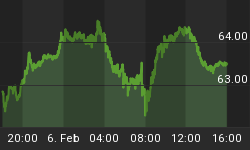It's amazing but true. Even after all we've been through and all we have supposedly learned about the danger of being over leveraged and borrowing more than you can pay back, we are still piling on debt.
I know that's not what you hear in the media. Wall Street and Washington are busy telling you that we are continuing to pay down debt and the health of the country's balance sheet is improving.
The truth is that consumers and businesses are paying down debt but their budgetary prudence is more than being offset by the profligacy of the government.
We can see from the Flow of Funds quarterly report put out by the Federal Reserve that households are reducing their debt at a 1.7% annual rate and business at a 1.8% annual rate. However, while the private sector gets their finances in order the Federal government is increasing its debt at a 28.2% annual rate!
The net effect is that the annual rate of increase in our nation's debt is currently 4.9%, which is even faster than the rate of increase of 4.1% experienced in Q1 2009. Yep, we are increasing our debt at a faster pace.
So all the talk about the economy healing, as consumers save and businesses pay down debt is false. Since the government's debt is our debt, there has been no deleveraging in the economy and there has been no repair made to the country's balance sheet. All we have done is trade an overleveraged consumer and financial institution's balance sheet for a now vastly overleveraged public balance sheet.
It is most likely to be the case that all we have accomplished is to hold in abeyance the eventual pain involved with deleveraging. That's because the government has the ability to leverage to a greater extent than the private sector and can maintain that leverage for a greater period of time (don't forget to thank the Chinese). However, the government's debt is our debt and eventually must result in being reconciled through higher taxes and/or inflation.
The only way we can save as a country is to have a current account surplus or by accumulating capital goods that are used to create wealth and grow the economy. We cannot save as a country by borrowing from foreign creditors to purchase more cars and houses. That's not saving. All that serves is to dig the nation deeper into its debt hole and place us further at the mercy of creditor nations who may not have the best interest of America first in mind.
And all this borrowing, spending is taking its toll on our currency. If the Fed and Treasury allow the dollar to continue its secular swoon, we may face a currency crisis -- especially if the decline becomes unruly. The Chinese could be forced to sell their Treasuries causing a global panic to flee the dollar, sending already vastly overpriced bond prices plummeting. Now I understand this would hurt our exporting creditors as well as the domestic economy. But is it reasonable to believe the Chinese will continue to ruin their environment, work very hard and squander their savings; just to own U.S. debt that is falling in value, held inside a currency that is crashing?
If the Chinese are going to go broke anyway they might as well unwind what is left of their savings. Then as soon as possible, build their middle class so they can consume their own production and cease relying on an export driven economy.
We must allow interest rates to rise to stop the fall in the dollar. We must stop going further into debt as a nation. And we must grow the economy as soon and as quickly as possible in order to make sure we can service our debt and the unfunded promises made to ourselves and our children.
But the need to act is being delayed because, for now, the fall in the dollar is boosting all asset classes including stocks and bonds. I can assure you this will not always be the case. Sooner rather than later, a falling dollar will mean that inflation has become intractable and it will not only crush the dollar and bonds but also the economy as well.
The time to get real and behave prudently was yesterday. If we continue to delude ourselves into thinking we are undergoing the healing process and that better days are here to stay, we face the probability that the next crisis will make the previous one look like a picnic.
Be sure to listen in on my Mid-Week Reality Check and to follow my blog Pentonomics
Follow me on Twitter: http://twitter.com/michaelpento















